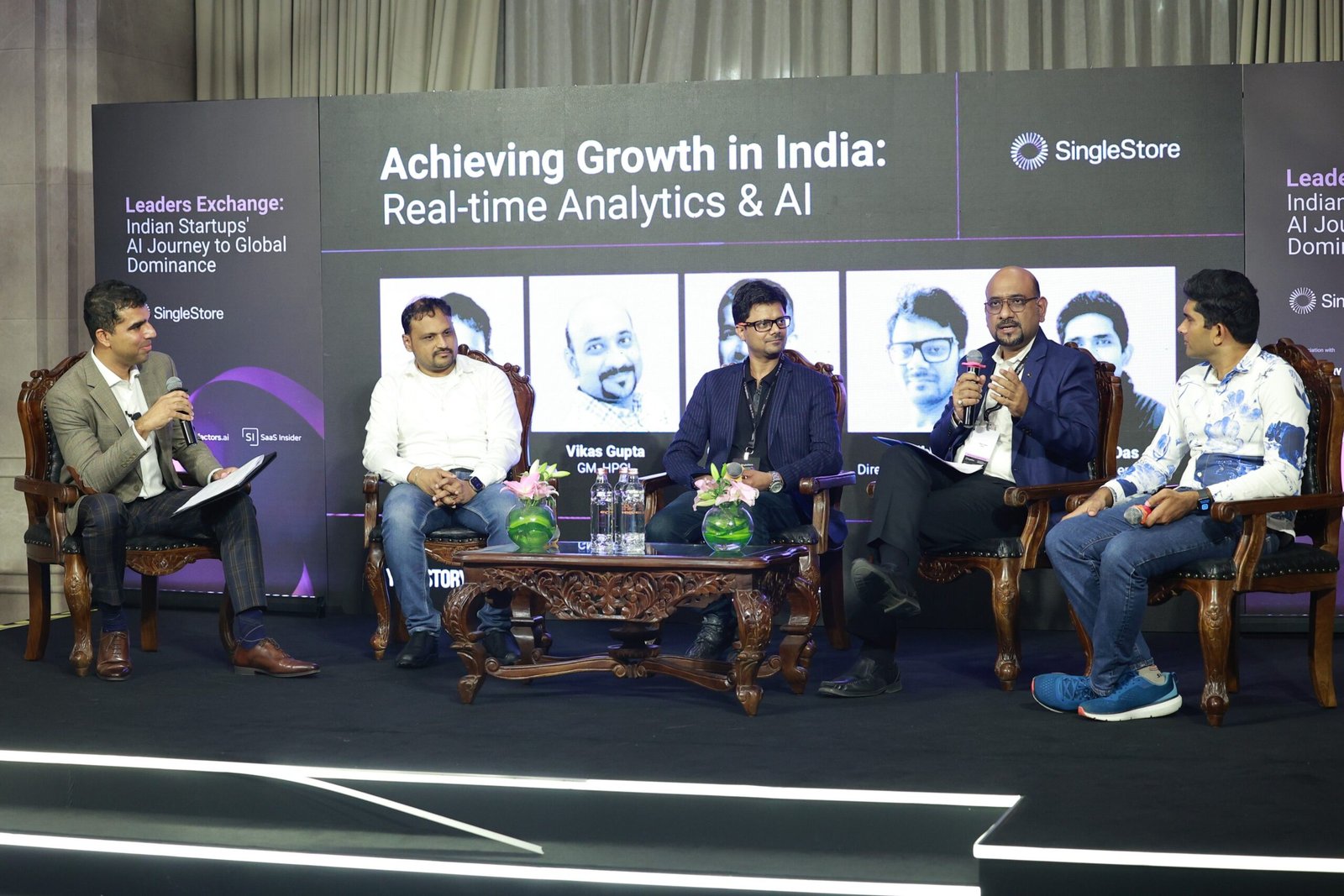[ad_1]
A good data experience is the key to winning or losing a customer. Today’s evolved and aware users seek real-time insights and analytics to make quick decisions. That creates the need for solid data infrastructure to support ever-changing business needs.
Enter SingleStore, the world’s fastest distributed SQL database for real-time analytical applications. It combines transactional and analytical workloads within a multi-model structure in a single engine.
Several case studies prove its success–many of which were highlighted at the Leaders Exchange: Indian Startups’ AI Journey to Global Dominance, organised by SingleStore in collaboration with YourStory.
Apart from the keynote address by Sanjay Arora, General Manager, APAC, SingleStore, the event included a fireside chat–Raj Verma, CEO, SingleStore, and Shradha Sharma, Founder and CEO, YourStory.
A panel discussion on ‘Achieving Growth in India: Real time analytics and AI’ brought together trailblazers like Praveen Das, Co-founder, factors.ai; Vikas Gupta, General Manager, HPCL; Vaibhav, Director of Engineering,BharatPe; and Sreedhar Gade, Vice President of Engineering, Freshworks. They discussed the unparalleled opportunities for Indian startups to achieve global dominance through the power of real-time AI. The session was moderated by George Kuruvilla, Senior Director, Data Platform Evangelist (APAC), SingleStore.
Leveraging real-time analytics for growth and decision-making
Elaborating on factors.ai’s journey, Das shared that the first year was all about building the product and getting a few customers on board. However, in 2021, they signed up with SingleStore, because their app was “horribly slow” and impacted customers.
“We did a few evaluations and had certain criteria like being cloud-neutral. We were looking for a single database for both analytical and transactional workloads. As a company, analytics is the core offering of our product,” he shared, adding that factors.ai has scaled from an S2 cluster to S12 cluster in the last three years.
The company has managed its growth without any single resource dedicated to infrastructure. “That’s the sort of advantage we have…our focus has purely been on the application,” Das said.
Gupta spoke about the varied challenges in operations and decision-making in the oil industry. HPCL has a platform, HP Udgam, to support startups and provide funding to those with a vision to grow the industry. But everything boils down to the value driven from data.
“Our products are commodity-based so we need to know how to deliver value to the customer. It is all about how one can offer a personalised experience to the customer. We have moved from ‘data is the new oil’ to ‘data is the daata (giver)’. If you want to earn your bread, you have to play with data,” he shared.
To manage operations, Gupta said it is important to put a governance layer on an OT platform to tell you what is right and what needs to be invested. “Safety is paramount for the oil and gas sector. We have been able to establish visual analytics at our retail outlets to enhance customer safety and avert untoward incidents,” he said, adding that the improved customer service is a consequence of the SingleStore collaboration.
Innovation for scaling
BharatPe reported a 77% surge in new merchant signups in February 2024. But how did the company navigate such large volumes? “It’s more about readiness regarding such scenarios. It can only be done through data infrastructure that we prepare and the data platform we choose. One obvious keyword that comes to everyone’s mind is auto scaling but it also has its limitations, “ he said. He added that handling such scenarios necessitates the implementation of multiple machine learning algorithms in the background, based on data collected in the past.
Freshworks, which started as a single product company in 2010, added multiple products and went public over time. Today, it has a presence in 100+ countries, with 65,000 customers across industry verticals.
“We have been innovating on GenAI and trying to stay ahead of the curve. We have Freshdesk, our customer experience product. We also have Freshservice and, on top of it, when you have Gen AI, you are talking about predictive analytics. Everyone is playing in the past or present; we are playing in the future,” Gade said.
Freshworks is looking to revolutionise customer experience through agentic actions. “We recently launched a beta version of self-service on our CX product where 100% of agent actions are taken by the AI, both on voice or text. This is just the beginning of things that are to come,” Gade said.

[ad_2]
Source link





